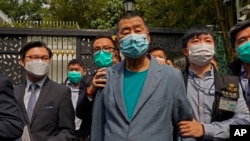Hong Kong police Saturday arrested 15 prominent democracy activists on charges of illegal assembly in the biggest crackdown on the semiautonomous city’s pro-democracy movement since mass, sometimes violent anti-government protests rocked the former British colony in June.
The move came hours after China’s top representative office in the city declared it was not bound by restrictions in Hong Kong’s constitution, the Basic Law, that bar the Chinese government from interfering in local affairs.
Later Saturday, U.S. Secretary of State Mike Pompeo called the arrests of the activists "deeply concerning."
He said in a tweet that "politicized law enforcement is inconsistent with universal values of freedom of expression, association and peaceful assembly."
Earlier this week, Chinese officials urged Hong Kong to enact national security legislation, amid accusations of Chinese overreach into the city’s legislative council and judiciary.
Those arrested included media tycoon Jimmy Lai; senior barrister Martin Lee, 81, founder of the Democratic Party; lawyer Albert Ho; barrister Margaret Ng; labor rights activist Lee Cheuk-yan; former legislators Cyd Ho and Leung Kwok-hung; and Figo Chan, the vice convener of the group Civil Human Rights Front, which has organized several mass protests approved by police last year.
The 15 arrested allegedly organized and took part in unlawful assemblies, and police “do not rule out that more will be arrested,” superintendent Lam Wing-Ho warned. They were accused of joining three unapproved protests on August 18, October 1 and October 20 last year, local media reported.
Hong Kong authorities have arrested more than 7,800 people for involvement in the anti-government protests, including many on rioting charges that can carry jail terms of up to 10 years.
Pro-democracy lawmakers say the arrests are an attempt to silence them ahead of the legislative council election in September, which makes the authorities nervous as they may claim a majority in the same way that they won a landslide victory in district council elections last November.
Pro-democracy lawmaker Claudia Mo said, “Beijing now calls itself above the Basic Law and is choreographing legal and judicial means, however twisted, to try to terrorize Hong Kong opposition.”
She said Beijing’s promise in the 1984 Sino-British Joint Declaration of the “one country, two systems” principle for at least 50 years after China resumed control in 1997 has become “one country, 1.01 systems.”
Democratic Party leader Wu Chi-wai said the arrests were the government’s attempt to silence the pro-democracy camp after mainland and Hong Kong officials this week stressed the need for Hong Kong to enact national security legislation.
Veteran China watcher Johnny Lau said the Hong Kong government and police are on an “all-out attack” on the pro-democracy camp by making an example of its leading figures in the hope of intimidating other critical voices in the run-up to the legislative council election. He said the authorities also hope to speed up the enactment of the national security law, which has been shelved since 2003 after a mass protest, possibly before the September vote.
“[Chinese President] Xi Jinping has lost his patience with the Basic Law and ‘one country, two systems,’ so they are blatantly twisting and trampling it according to their own needs,” he said.
He said while the world is busy fighting COVID-19, “in Xi’s eyes this is an opportunity to shuffle the cards and to assert its narrative.”
“If the foreign countries turn a blind eye and fail to rein in [China’s power], they would also be impacted,” Lau said.
Sophie Richardson, China director at U.S.-based Human Rights Watch, said “today’s arrests of pro-democracy figures in Hong Kong is another nail in the coffin of ‘one country, two systems.’ ”







